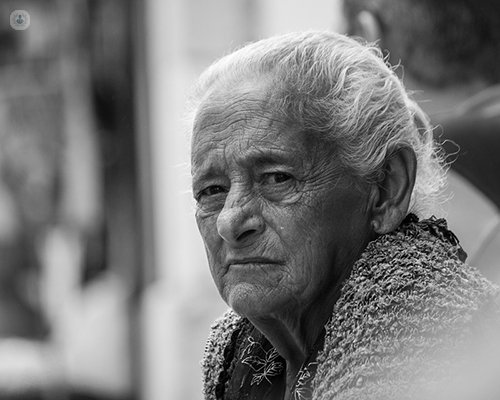Depression in the elderly
Written by:Depression is a sad mood. It is characterized by a mood disorder in which sadness is disproportionate, the person loses interest, and even the illusion of living, feeling unable to perform their previous activities. Along with this sadness sleep disturbance, loss of appetite or somatic symptoms such as malaise, fatigue or feeling of breathlessness may appear, among others. In fact, it is very rare that an old man go by sadness to consult a specialist in geriatrics , but usually explain these somatic problems that mask the true diagnosis of a depressive syndrome.
Speaking incidence of depression in the elderly is not easy since it is an underdiagnosed condition to mistakenly thought of as a "normal" aging process. It is estimated that up to 30% of the elderly living in their homes have depression, value greater than 35% if they are institutionalized in nursing homes or up to 45% centers when they are hospitalized coinciding with an intercurrent acute process that affects their health.

Causes of depression in elderly
The most common causes of depression in the elderly are:
- Soledad: is one of the main reasons for depression in elderly. It is important to note that a person can feel lonely despite being accompanied. In the context of the elderly it is closely related to widowhood, despite the likely support of children and / or relatives.
- Functional dependence: can justify the need for third parties to perform basic activities of daily life, especially if it is accompanied by pain. You can trigger a depressive mood.
- Presence of comorbidity: polypharmacy entails and probably often go to the doctor, either medical consultation itself and with repeat hospital admissions. You can justify the fear of dependence and / or death, and trigger depressive.
- Mood and cognitive deficits go hand in hand: the cognitive capacity of people both to incorporate information to recall any information recorded in the brain requires a predisposition of attention, alertness, which in depressive states not present, the which justifies some diagnoses of depression in patients attending the consultation to rule out dementia. In parallel, especially in the early stages of cognitive decline, even where the person is aware of his lack of memory and "blind spots" can lead to a reactive depressive symptoms.
- Retirement: this is one of the commonly recognized causes as a trigger for depression, especially among men. In recent years it has diminished its role probably thanks to active aging policies that are making a change in lifestyle of the elderly and a positive vision of this stage of life.
How to treat an old man with depression?
Suspecting a depressive process in the elderly, it is important to request a specialized geriatric assessment. The action plan is based on three pillars:
- Determining the cause that triggered the depression. It is therefore crucial doctor-patient communication, preferably alone, without any family, allowing hondar on issues such as loneliness, death or dependency. Then agree to share the therapeutic plan and management with relatives, who must "help" the patient overcome this disease process.
- Drug treatment is essential. It must be given an individualized antidepressant depending on each person and predominant symptoms: If prevails apathy, insomnia or lack of appetite, or if it is associated with anxiety. It is important not to forget the increased risk of side effects of antidepressants in the geriatric population and / or interaction with other drugs.
- Nonpharmacological therapy is also essential. It is important to regain self-esteem and overcome certain "fears". This requires foster communication and participation in psychomotor activities, reminiscence or crafts, facilitating an "active" state of the person. Although there is not much experience in the techniques of meditation or mindfulness in the geriatric population, compared to other areas such as oncology and / or care for young people can help in managing the depressive process, although its success in the elderly population is likely to be less given to this multifactorial component of depression in the elderly.


